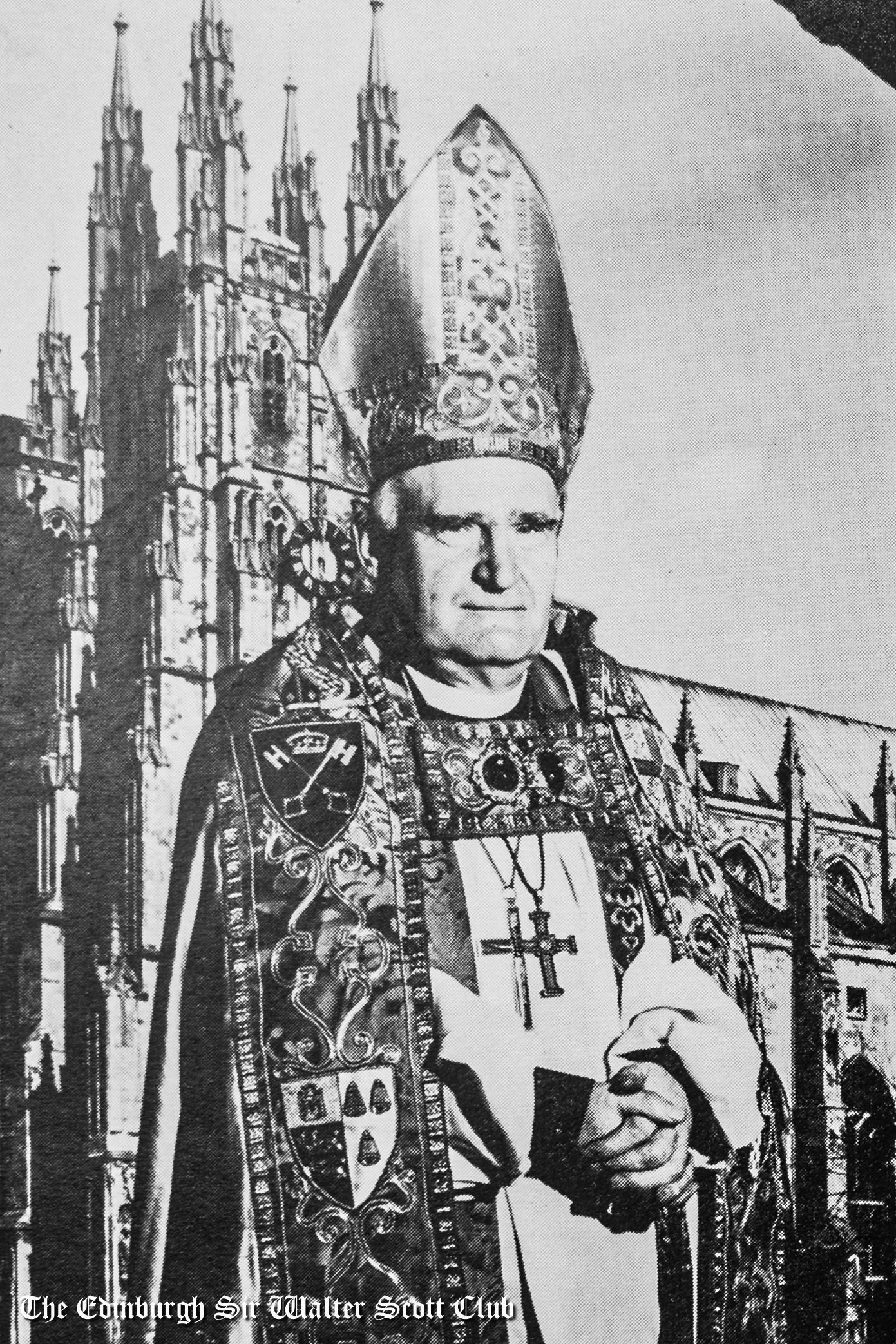1960
Our President in 1960/61 was:
The Most Rev. and Right Hon. Arthur Michael Ramsay, Lord Archbishop of York
He proposed the Toast to Sir Walter at our 53rd Annual Dinner on Friday 17th March 1961 in The North British Hotel
Download the [transcript] or read the [bulletin]
Summary of the Speech:
Archbishop Ramsay delivered a wide-ranging, impassioned homage to Sir Walter Scott, framing it as a literary pilgrimage through Scott's major works and their themes. His speech was structured as both a celebration of Scott’s literary genius and a reflection on his enduring humanity.
Key Points of the Toast:
- Scott’s Dualities and Universal Themes:
- Waverley is praised for its prophetic genius and rich contrasts—between Highland and Lowland, Whig and Jacobite, comedy and tragedy. Scott’s talent lay in his balanced sympathies and deep understanding of humanity, never taking sides but exploring the moral tensions of both.
- Character and Humanity:
- Scott’s characters, from Meg Merrilees to Dirk Hatteraick, are imbued with moral and psychological depth. Even the rogues have a redemptive charm, while the tragic fates evoke empathy and reflection.
- Highlighting the Novels:
- Guy Mannering: Noteworthy not for the titular hero but for its supporting characters and vivid lowland setting.
- Old Mortality: Considered by Ramsay as perhaps Scott’s most perfect novel for its relentless inspiration and movement.
- The Heart of Midlothian: Criticised for some plot contrivances but praised for its moral intensity and psychological realism, particularly in Jeanie Deans.
- Rob Roy: A tale of romantic and social contrasts, weakened by plot but rescued by characters like Die Vernon and Andrew Fairservice.
- The Bride of Lammermoor: A rare, tightly crafted tragedy—“ugly and cruel” but masterful in execution.
- Redgauntlet: Celebrated for its loose but evocative form and especially for “Wandering Willie’s Tale”.
- The later historical novels (Ivanhoe, The Abbot, The Monastery, etc.): Scott’s portrayal of the Middle Ages helped shape Victorian ideas of history and contributed to movements like the Oxford Movement. Though sometimes historically inaccurate, these novels restored colour and personality to the medieval world.
- Scott’s Religion and Philosophy:
- Scott was not a theologian but a deeply moral man whose faith was shaped by suffering. His Christianity was practical—rooted in mercy, justice, and empathy.
- His work embodies a blend of the tragic and the comic, often using humour to temper solemnity, exemplified in characters like Wildrake and scenes such as Meg Merrilees’ scathing condemnation.
- Criticisms Addressed:
- Ramsay acknowledges that Scott’s plots are sometimes awkward and his love stories unconvincing. However, he counters that the richness of Scott’s characterisation, historical imagination, and moral landscape outweigh such flaws.
- The so-called “lingering” in Scott’s prose is defended as a strength: a reflection of his deep interest in setting, time, and ordinary lives.
- Closing Sentiment:
- Ramsay concludes with a toast to “the Immortal Memory of Sir Walter Scott,” affirming Scott’s unique role in capturing the soul of Scotland—and of humanity—in literature.
Notable and Interesting Aspects:
- Erudite and Thematic Structure: Ramsay weaves literary criticism with moral reflection, creating a speech that feels both scholarly and pastoral.
- Use of Latin and Classical References: Quotations like “victrix causa Deis placuit sed victa Catoni” and references to Trevelyan and Macaulay add intellectual gravitas.
- Contrast Between England and Scotland in Scott’s Work: Ramsay notes a qualitative difference between Scott’s English and Scottish novels, finding more inspiration in the latter.
- Personal Tone: The Archbishop begins with “my homage tonight will be a pilgrimage,” setting a reverent and intimate tone for the speech.
Download the [transcript] or read the [bulletin]

Subsidiary Toasts
The toasts of “The Queen” and “The Royal Family” were duly honoured.
Thereafter The Rev. Professor Edgar P. Dickie, M.C., D.D., proposed the toast of “The Imperial Forces”, to which Air Vice-Marshal R. B. Thomson, C.B., D.S.O., D.F.C. replied.
“The City of Edinburgh” was proposed by Sheriff D. M. Campbell, Q.C., and replied to by Bailie James N. McKay, representing the Lord Provost of The City of Edinburgh.
The toast of “The Chairman” was proposed by the Very Rev. Charles L. Warr, K.C.V.O., D.D., LL.D.


